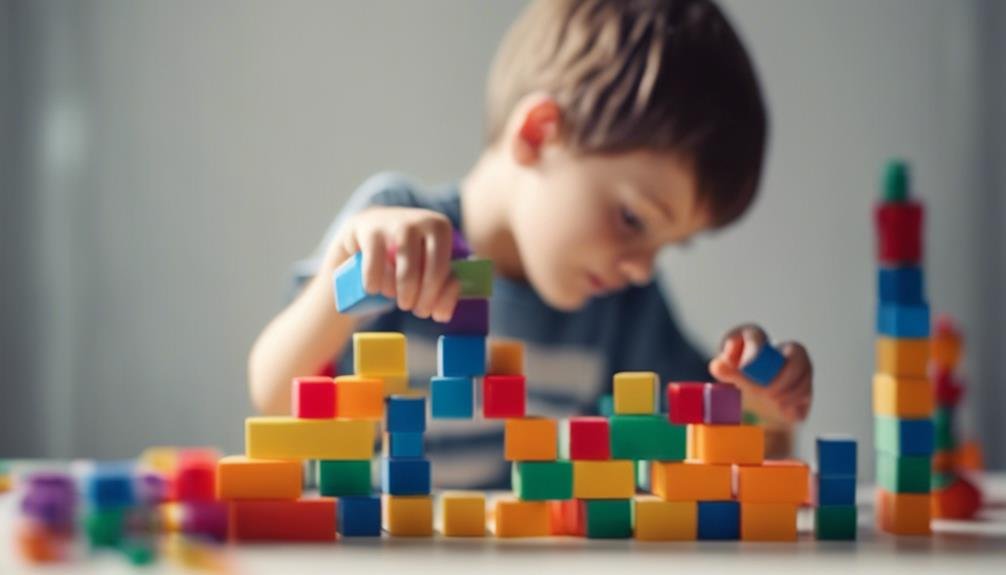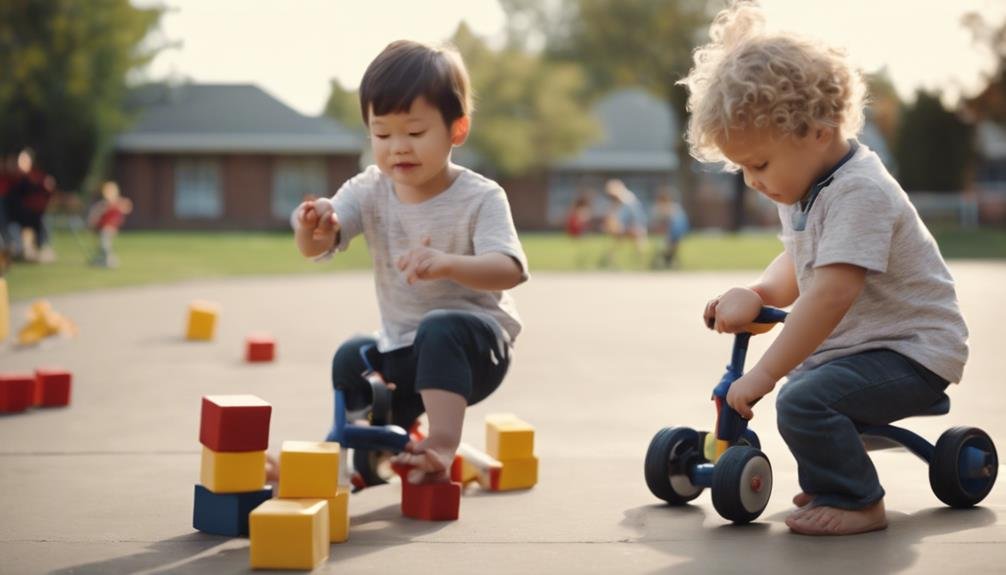"Cherishing Little Steps - A Haven for Baby and Family Journeys"
The Basics of Child Development: What Parents Need to Know
As a parent, you stand at the threshold of understanding the intricate tapestry of your child's growth. Each thread woven into the fabric of their development forms a unique pattern that shapes who they are becoming.
But where do you begin unraveling this complex design? Let's explore the foundational blocks of child development that every parent should grasp to support their child's journey towards a fulfilling future.
Key Takeaways
- Proper nutrition and balanced diet crucial for physical and cognitive growth.
- Cultivating emotional intelligence and resilient coping skills in children.
- Early exposure to language enhances cognitive development and problem-solving abilities.
- Tailored parenting strategies, consistent discipline, and open communication foster optimal child development.
Growth Milestones

As a parent or caregiver, you'll witness your child hitting important growth milestones that mark their developmental journey. These physical milestones are important indicators of your child's overall well-being and progress. From their first steps to their ability to grasp objects, each achievement showcases their growth and capabilities. Ensuring your child receives proper nutrition is key to supporting their development. A well-balanced diet rich in essential nutrients plays a significant role in fueling their growth and cognitive functions.
Nutrition and development are intricately linked, with the foods your child consumes impacting their physical and mental growth. Providing a variety of fruits, vegetables, whole grains, and proteins is essential for their overall health. As you observe your child reaching physical milestones, remember that their diet plays a key role in reaching these milestones smoothly. By offering nutritious meals and snacks, you're actively contributing to their growth and development. Stay attuned to their needs and celebrate each milestone, knowing that you're nurturing their journey towards a healthy and thriving future.
Emotional Development
Understanding your child's emotional development is essential for nurturing their overall well-being and resilience. As a parent, being attuned to your child's emotions can help you guide them through the ups and downs of life. Here are some key points to take into account:
- Temperament regulation: Each child has a unique way of reacting to and managing their emotions. Pay attention to your child's temperament and help them develop healthy coping mechanisms.
- Attachment styles: The bond between you and your child plays a vital role in their emotional development. Nurturing a secure attachment can provide them with a strong foundation for building relationships in the future.
- Recognizing emotions: Help your child identify and label their feelings. This can enhance their emotional intelligence and communication skills.
- Encouraging expression: Create a safe space for your child to express their emotions without judgment. Encouraging open communication can strengthen your relationship.
- Teaching coping strategies: Equip your child with effective ways to manage stress and regulate their emotions. Teaching them coping strategies will empower them to navigate life's challenges with resilience.
Cognitive Skills

To further support your child's development, exploring their cognitive skills opens up a world of understanding their learning processes and problem-solving abilities. Cognitive skills encompass various mental abilities that your child uses daily, such as memory retention and problem-solving skills.
Memory retention involves the brain's ability to store, retain, and recall information over time. You may notice your child remembering details from past experiences or conversations, showcasing their developing memory skills.
Problem-solving skills are essential for steering challenges and discovering solutions. Encouraging your child to engage in puzzles, riddles, or open-ended questions can enhance their critical thinking and problem-solving abilities. Observing how your child approaches problems can provide insight into their cognitive development and areas where they may need support.
Social Interactions
Encouraging meaningful interactions with others fosters your child's social development and emotional intelligence. Engaging with peers helps your child learn important social skills that are essential for their future relationships and overall well-being.
Here are some key points to think about:
- Peer relationships: Encourage your child to interact with peers regularly to develop empathy, cooperation, and conflict resolution skills.
- Social skills: Teach your child effective communication strategies such as active listening, taking turns, and expressing emotions in a healthy way.
- Group dynamics: Help your child understand the dynamics of group interactions, including sharing, compromising, and working towards common goals.
- Empathy: Cultivate empathy in your child by encouraging them to take into account others' feelings and perspectives during social interactions.
- Building friendships: Support your child in forming and maintaining friendships, as these relationships play an essential role in their social development.
Language Acquisition

As your child engages in social interactions and learns from their peers, they're also beginning on the fascinating journey of language acquisition. This period is critical for their cognitive development, as they start to understand and use words to communicate their thoughts and feelings.
Early exposure to language, whether in one or multiple languages, can bring about bilingual benefits. Children exposed to more than one language from a young age often show enhanced cognitive abilities and flexibility in their thinking. It's never too early to introduce different languages to your child.
However, some children may experience delays in reaching language milestones. In such cases, speech therapy can be incredibly beneficial. Speech therapists are trained to work with children to improve their communication skills and overcome any obstacles they may face in language development.
Play and Learning
Engage your child in play to foster their learning and development in a fun and interactive way. Play exploration is essential for children as it not only entertains them but also provides numerous educational benefits. Here are some key points to contemplate:
- Promotes Creativity: Play allows children to use their imagination and creativity freely, which is vital for their cognitive development.
- Enhances Social Skills: Through play, children learn how to interact with others, share, take turns, and communicate effectively.
- Boosts Problem-Solving Skills: Engaging in different types of play activities helps children develop critical thinking and problem-solving abilities.
- Encourages Physical Development: Play activities like running, jumping, and climbing contribute to the development of motor skills and overall physical health.
- Fosters Emotional Regulation: Play provides a safe space for children to express their emotions, learn to control them, and develop empathy towards others.
Motor Skills Development

Understanding how motor skills development plays a significant role in your child's overall growth and capabilities can provide valuable insights into their physical and cognitive progress.
Fine motor skills involve the coordination of small muscles, such as those in the hands and fingers, enabling tasks like writing, buttoning a shirt, or using utensils. As your child hones these skills, they're enhancing their dexterity and hand-eye coordination.
Gross motor skills, on the other hand, involve larger muscle groups and are essential for activities like running, jumping, and balancing. These skills are vital for overall physical strength and coordination.
Behavioral Patterns
Exploring the various behavioral patterns your child displays can offer valuable insights into their emotions and thought processes. Understanding your child's temperament differences and learning styles is essential in tailoring your parenting approach effectively. Here are some key points to think about:
- Temperament Differences: Recognize that each child is unique and may react differently to various situations. Being aware of your child's temperament can help you adjust your expectations and responses accordingly.
- Learning Styles: Pay attention to how your child best absorbs information – whether visually, auditory, kinesthetically, or through other means. Adapting your communication and teaching methods to suit their learning style can enhance their understanding and development.
- Discipline Strategies: Implementing consistent and age-appropriate discipline techniques can help shape your child's behavior positively. Setting clear boundaries and consequences fosters a sense of security and understanding.
- Communication Techniques: Open, honest, and empathetic communication lays the foundation for a strong parent-child relationship. Actively listening to your child's thoughts and feelings encourages trust and mutual respect.
- Individualized Approach: Remember that what works for one child may not work for another. Tailoring your parenting strategies to fit your child's unique behavioral patterns is key to nurturing their growth and well-being.
Parent-Child Bonding

To strengthen the bond between you and your child, prioritize quality time spent together engaging in activities that promote connection and mutual understanding. Attachment security is vital for your child's emotional well-being. By being responsive to their needs and consistently providing comfort and support, you help build a strong foundation of trust and security.
Communication styles also play a significant role in parent-child bonding. Encouraging open and honest communication allows your child to express their thoughts and feelings freely, fostering a deeper connection between you both.
Trust building is a continuous process that requires patience and understanding. Showing up for your child, being reliable, and following through on your promises help cultivate trust in your relationship. Additionally, supporting your child in developing emotional regulation skills is essential. By helping them identify and manage their emotions in a healthy way, you equip them with valuable tools for navigating life's challenges.
Prioritizing these aspects of parent-child bonding creates a nurturing environment where your child feels loved, secure, and understood.
Healthy Habits
To maintain a strong parent-child bond, incorporating healthy habits into your daily routine is key for promoting overall well-being and harmony within your family dynamic.
Here are some essential healthy habits to ponder:
- Nutrition Choices: Encourage a balanced diet rich in fruits, vegetables, whole grains, and lean proteins to support your child's growth and development.
- Exercise Routines: Engage in physical activities together to boost energy levels, improve mood, and foster a healthy lifestyle for both you and your child.
- Screen Time Limits: Set boundaries on screen time to make sure your child has time for other activities like reading, playing outdoors, or engaging in creative pursuits.
- Bedtime Routines: Establish a calming bedtime routine to promote quality sleep, which is critical for your child's physical and mental well-being.
Educational Support

Supporting your child's educational journey starts with creating a nurturing environment that encourages curiosity and learning. Understanding your child's learning style is important in tailoring educational support. Some children thrive with visual aids, while others may prefer hands-on activities. By recognizing these differences, you can adapt teaching strategies to suit your child's individual needs and enhance their academic achievement.
School readiness is another essential aspect of educational support. Helping your child develop essential skills like language, numeracy, and social interaction before they start school can greatly impact their early success. Engage in activities that promote cognitive development, such as reading together or solving puzzles, to boost their readiness for formal education.
Moreover, fostering a positive attitude towards learning is key. Encourage your child to ask questions, explore new topics, and make connections between what they learn and their daily experiences. By instilling a love for learning early on, you set the stage for a fulfilling educational journey ahead.
Monitoring Progress
As your child progresses in their learning journey, staying attuned to their development and academic achievements becomes a valuable endeavor. Keeping a close eye on their growth and accomplishments can provide great insight into their overall well-being and help you support them effectively.
Here are some key points to contemplate when monitoring your child's progress:
- Tracking Development: Regularly assess your child's developmental milestones to confirm they're on the right path for their age.
- Observing Behaviors: Pay attention to your child's behaviors and interactions with others to identify any trends or changes that may require further attention.
- Recognizing Patterns: Look for patterns in your child's academic performance or social interactions to understand their strengths and areas that may need improvement.
- Seeking Feedback: Don't hesitate to reach out to teachers or other caregivers for feedback on your child's progress in different areas.
- Celebrating Achievements: Remember to celebrate your child's successes, big or small, to boost their confidence and motivation.
Frequently Asked Questions
How Can Parents Help Their Child Cope With Anxiety and Stress During Key Developmental Stages?
To help your child cope with anxiety and stress, try mindfulness techniques and relaxation exercises. Teach emotional regulation and offer positive reinforcement. Your support and understanding during key developmental stages will make a significant difference in their well-being.
What Are Some Effective Strategies for Addressing Behavior Challenges in Children With Special Needs?
When helping children with special needs navigate behavior challenges, remember to emphasize positive reinforcement. Utilize sensory tools to promote calmness and focus. Incorporate behavior modification techniques and social stories to guide understanding and communication effectively.
How Can Parents Encourage Creativity and Critical Thinking Skills in Their Child's Development?
Encouraging creativity and critical thinking in your child involves nurturing their art exploration to boost imagination and problem-solving skills. Engage in activities that inspire them to think critically and analyze situations.
What Are the Potential Long-Term Effects of Excessive Screen Time on a Child's Development?
Hey there! Spending too much time on screens can seriously impact your child's development. Excessive screen time can hinder cognitive growth and social skills. It's important to balance tech use with other activities for their well-being.
How Can Parents Support Their Child's Emotional Intelligence and Resilience in Today's Fast-Paced and Technology-Driven World?
To support your child's emotional intelligence and resilience in today's fast-paced world, practice mindful parenting. Help them regulate emotions, build resilience by setting technology boundaries, and engage in open conversations. Your presence and guidance matter.
Conclusion
As a parent, you play an essential role in your child's development journey. By understanding the basics of child development and actively supporting their growth, you're setting them up for success.
Remember, every milestone achieved is a step closer to revealing their full potential. So keep nurturing, guiding, and loving your little one with all your heart – the sky's the limit for what they can achieve with your unwavering support.


